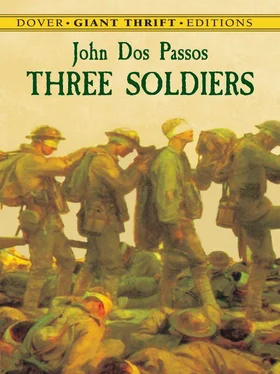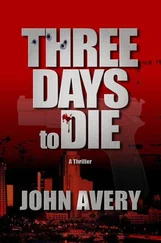“The cook here’s from Marseilles,” said Henslowe, as they settled themselves at a table for four.
“I wonder if the rest of them lost the way,” said Andrews.
“More likely old Heinz stopped to have a drink,” said Henslowe. “Let’s have some hors d’ouvre while we are waiting.”
The waitress brought a collection of boat-shaped plates of red salads and yellow salads and green salads and two little wooden tubs with herrings and anchovies.
Henslowe stopped her as she was going, saying:
“Rien de plus?” The waitress contemplated the array with a tragic air, her arms folded over her ample bosom.
“Que vouley-vous, Monsieur, c’est l’armistice.”
“The greatest fake about all this war business is the peace. I tell you, not till the hours d’ouvre has been restored to its proper abundance and variety will I admit that the war’s over.”
The waitress tittered.
“Things aren’t what they used to be,” she said, going back to the kitchen.
Heineman burst into the restaurant at that moment, slamming the door behind him so that the glass rang, and the fat woman and the hairy man started violently in their chairs. He tumbled into a place, grinning broadly.
“And what have you done to Walters?”
Heineman wiped his glasses meticulously.
“Oh, he died of drinking raspberry shrub,” he said… “Dee-dong peteet du ving de Bourgogne,” he shouted towards the waitress in his nasal French. Then he added: “Le Guy is coming in a minute, I just met him.”
The restaurant was gradually filling up with men and women of very various costumes, with a good sprinkling of Americans in uniform and out.
“God, I hate people who don’t drink,” cried Heineman, pouring out wine. “A man who don’t drink just cumbers the earth.”
“How are you going to take it in America when they have prohibition?”
“Don’t talk about it; here’s le Guy. I wouldn’t have him know I belong to a nation that prohibits good liquor… Monsieur le Guy, Monsieur Henslowe et Monsieur Andrews,” he continued getting up ceremoniously. A little man with twirled mustaches and a small vandyke beard sat down at the fourth place. He had a faintly red nose and little twinkling eyes.
“How glad I am,” he said, exposing his starched cuffs with a curious gesture, “to have some one to dine with! When one begins to get old loneliness is impossible. It is only youth that dares think… Afterwards one has only one thing to think about: old age.”
“There’s always work,” said Andrews.
“Slavery. Any work is slavery. What is the use of freeing your intellect if you sell yourself again to the first bidder?”
“Rot!” said Heineman, pouring out from a new bottle.
Andrews had begun to notice the girl who sat at the next table, in front of a pale young soldier in French-blue who resembled her extraordinarily. She had high cheek bones and a forehead in which the modelling of the skull showed through the transparent, faintly-olive skin. Her heavy chestnut hair was coiled carelessly at the back of her head. She spoke very quietly, and pressed her lips together when she smiled. She ate quickly and neatly, like a cat.
The restaurant had gradually filled up with people. The waitress and the patron, a fat man with a wide red sash coiled tightly round his waist, moved with difficulty among the crowded tables. A woman at a table in the corner, with dead white skin and drugged staring eyes, kept laughing hoarsely, leaning her head, in a hat with bedraggled white plumes, against the wall. There was a constant jingle of plates and glasses, and an oily fume of food and women’s clothes and wine.
“D’you want to know what I really did with your friend?” said Heineman, leaning towards Andrews.
“I hope you didn’t push him into the Seine.”
“It was damn impolite… But hell, it was damn impolite of him not to drink… No use wasting time with a man who don’t drink. I took him into a café and asked him to wait while I telephoned. I guess he’s still waiting. One of the whoreiest cafés on the whole Boulevard Clichy.” Heineman laughed uproariously and started explaining it in nasal French to M. le Guy.
Andrews flushed with annoyance for a moment, but soon started laughing. Heineman had started singing again.
Everybody clapped. The white-faced woman in the corner cried “Bravo, Bravo,” in a shrill nightmare voice.
Heineman bowed, his big grinning face bobbing up and down like the face of a Chinese figure in porcelain.
“Lui est Sinbad,” he cried, pointing with a wide gesture towards Henslowe.
“Give ’em some more, Heinz. Give them some more,” said Henslowe, laughing.
Everybody cheered again; Andrews kept looking at the girl at the next table, whose face was red from laughter. She had a handkerchief pressed to her mouth, and kept saying in a low voice:
“O qu’il est drôle, celui-là… O qu’il est drôle.”
Heineman picked up a glass and waved it in the air before drinking it off. Several people got up and filled it up from their bottles with white wine and red. The French soldier at the next table pulled an army canteen from under his chair and hung it round Heineman’s neck.
Heineman, his face crimson, bowed to all sides, more like a Chinese porcelain figure than ever, and started singing in all solemnity this time.
His chunky body swayed to the ragtime. The woman in the corner kept time with long white arms raised above her head.
“Bet she’s a snake charmer,” said Henslowe.
Heineman waved his arms, pointed again to Henslowe, and sank into his chair saying in the tones of a Shakespearean actor:
“C’est lui Sinbad.”
The girl hid her face on the tablecloth, shaken with laughter. Andrews could hear a convulsed little voice saying:
“O qu’il est rigolo… ”
Heineman took off the canteen and handed it back to the French soldier.
“Merci, Camarade,” he said solemnly.
“Eh bien, Jeanne, c’est temps de ficher le camp,” said the French soldier to the girl. They got up. He shook hands with the Americans. Andrews caught the girl’s eye and they both started laughing convulsively again. Andrews noticed how erect and supple she walked as his eyes followed her to the door.
Andrews’s party followed soon after.
“We’ve got to hurry if we want to get to the Lapin Agile before closing… and I’ve got to have a drink,” said Heineman, still talking in his stagey Shakespearean voice.
“Have you ever been on the stage?” asked Andrews.
“What stage, sir? I’m in the last stages now, sir… I am an artistic photographer and none other… Moki and I are going into the movies together when they decide to have peace.”
“Who’s Moki?”
“Moki Hadj is the lady in the salmon-colored dress,” said Henslowe, in a loud stage whisper in Andrews’s ear. They have a lion cub named Bubu. “Our first born,” said Heineman with a wave of the hand.
The streets were deserted. A thin ray of moonlight, bursting now and then through the heavy clouds, lit up low houses and roughly-cobbled streets and the flights of steps with rare dim lamps bracketed in house walls that led up to the Butte.
There was a gendarme in front of the door of the Lapin Agile. The street was still full of groups that had just come out, American officers and Y.M.C.A. women with a sprinkling of the inhabitants of the region.
“Now look, we’re late,” groaned Heineman in a tearful voice.
“Never mind, Heinz,” said Henslowe, “le Guy’ll take us to see de Clocheville like he did last time, n’est pas, le Guy?” Then Andrews heard him add, talking to a man he had not seen before, “Come along Aubrey, I’ll introduce you later.”
They climbed further up the hill. There was a scent of wet gardens in the air, entirely silent except for the clatter of their feet on the cobbles. Heineman was dancing a sort of a jig at the head of the procession. They stopped before a tall cadaverous house and started climbing a rickety wooden stairway.
Читать дальше












